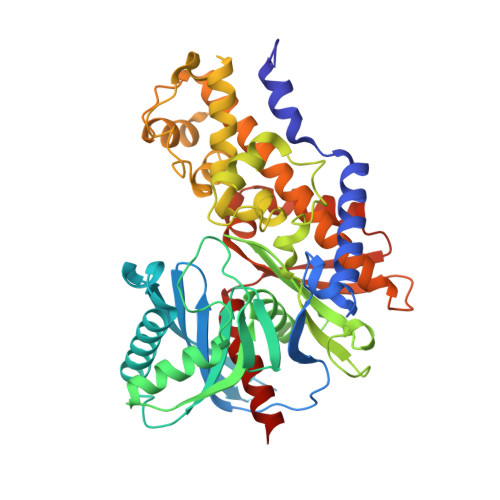Investigation of functionally liver selective glucokinase activators for the treatment of type 2 diabetes.
Bebernitz, G.R., Beaulieu, V., Dale, B.A., Deacon, R., Duttaroy, A., Gao, J., Grondine, M.S., Gupta, R.C., Kakmak, M., Kavana, M., Kirman, L.C., Liang, J., Maniara, W.M., Munshi, S., Nadkarni, S.S., Schuster, H.F., Stams, T., St Denny, I., Taslimi, P.M., Vash, B., Caplan, S.L.(2009) J Med Chem 52: 6142-6152
- PubMed: 19746978
- DOI: https://doi.org/10.1021/jm900839k
- Primary Citation of Related Structures:
3IMX - PubMed Abstract:
Type 2 diabetes is a polygenic disease which afflicts nearly 200 million people worldwide and is expected to increase to near epidemic levels over the next 10-15 years. Glucokinase (GK) activators are currently under investigation by a number of pharmaceutical companies with only a few reaching early clinical evaluation. A GK activator has the promise of potentially affecting both the beta-cells of the pancreas, by improving glucose sensitive insulin secretion, as well as the liver, by reducing uncontrolled glucose output and restoring post-prandial glucose uptake and storage as glycogen. Herein, we report our efforts on a sulfonamide chemotype with the aim to generate liver selective GK activators which culminated in the discovery of 3-cyclopentyl-N-(5-methoxy-thiazolo[5,4-b]pyridin-2-yl)-2-[4-(4-methyl-piperazine-1-sulfonyl)-phenyl]-propionamide (17c). This compound activated the GK enzyme (alphaK(a) = 39 nM) in vitro at low nanomolar concentrations and significantly reduced glucose levels during an oral glucose tolerance test in normal mice.
- Novartis Institutes for BioMedical Research, Inc., Cambridge, Massachusetts 02139, USA. greg.bebernitz@novartis.com
Organizational Affiliation:



















